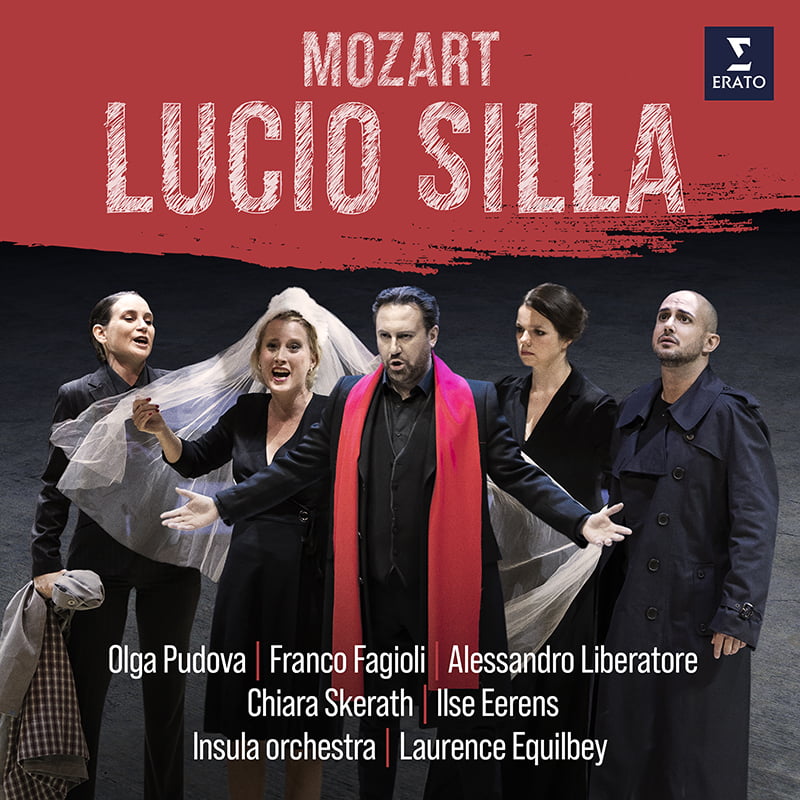 Lucio Silla isn’t one of Mozart’s best-known operas. Composed in 1772, when he was just 16 years old, it was his third and final commission from Milan. It premiered on 26 December 1772 at Teatro Regio Ducale.
Lucio Silla isn’t one of Mozart’s best-known operas. Composed in 1772, when he was just 16 years old, it was his third and final commission from Milan. It premiered on 26 December 1772 at Teatro Regio Ducale.
It tells the story of Lucio Silla, the eponymous dictator of Rome who has deposed Marius and put him to death. He is now wooing Marius’s daughter Giunia, who resists his advances. Her husband Cecilio was banished by Silla, and she now assumes him to be dead.
But Cecilio lives, and has returned to save his wife. He can count on the support of his loyal friend Cinna in this endeavour. Silla, meanwhile, is backed up by his sister Celia.
This recording from Warner Classics was made in June 2021, at La Seine Musicale in Paris. It features Italian tenor Alessandro Liberatore as Lucio Silla, while Ukrainian soprano Olga Pudova sings the strikingly virtuosic role of Giunia. Argentinian countertenor Franco Fagioli is the exiled senator Cecilio.
Swiss soprano Chiara Skerath takes the traditionally castrato role of Cecilio’s best friend Cinna, and Belgian soprano Ilse Eerens is Celia, Silla’s sister. The chorus is Le Jeune Choeur de Paris, and the Insula orchestra is conducted by Laurence Equilbey, who founded the ensemble in 2012.
Lucio Silla is rarely performed, partly because the score is lengthy and the vocal writing highly demanding. Equilbey has chosen to record it in a slightly abridged version, condensing the drama and tightening the narrative. It’s a wise move – even in this shortened version, both CDs in this two-CD set run to just over an hour long.
The music is incredibly beautiful for such a serious subject and played here with an exceptionally light touch. Under Equilbey’s expert baton, the orchestra is lively and dynamic, the drama moving swiftly along. The singers are superbly supported.
The singing is incredibly exacting and very well handled here by the young cast. They all have wonderful clarity of tone. Pudova as Giunia especially has exceptional technical ability, tackling the very challenging coloratura asked of her. Her voice soars as the music rises and falls – check out particularly her aria ‘Ah se il crudel periglio’ (‘Ah when the cruel peril’).
The different quality of a countertenor compared to a soprano is nicely demonstrated in the duets between Cecilio and Giunia. Both singers have beautifully expressive voices and these pieces are especially moving.
Countertenors are sometimes criticised as being weak voiced, but Fagioli gives the lie to that charge here. As Cecilio, his voice is full throated and powerful, though also at times tender and full of emotion.
His rival Silla is the only tenor in the cast. Liberatore’s voice is well rounded, expansive and rich. He has a vocal authority that suits the role of the antihero well. The trio ‘Quell’orgoglioso sdegno’ (‘This criminal temerity’) featuring Silla, Cecilio and Giunia is really quite beautiful.
Eerens, as Silla’s devoted sister Celia, is smooth and clear; she demonstrates great precision in the staccato sections. Skerath, singing the role of Cinna, also handles the vocal acrobatics well. Broad and expressive, she is one to watch out for.
The CD booklet comes with a conductor’s note from Equilbey and notes from a discussion between musicologist Florence Badol-Bertrand and the orchestra’s own musicologist, Blandine Berthelot. The latter was originally intended as an essay by Badol-Bertrand, but she sadly died in 2020 before the piece was written.
There is also a synopsis of the opera. These are all presented in French, English and German. The libretto is given in Italian and English, completing the package.
More info
Tech spec
• Mozart: Lucio Silla by Laurence Equilbey And Insula Orchestra (Warner Classics)
• Price: £16.45
• Format: two-CD set, digital download
• Total run time: 126 minutes, 33 seconds
• Tracks: 41 (16 on CD 1, 25 on CD 2)
• Stream and download: available from iTunes
• Release date: 8 April 2022
• More information: from Warner Classics
Verdict
Equiilbey’s Lucio Silla is a lively and expertly sung version of an opera that probably deserves to be better known.
